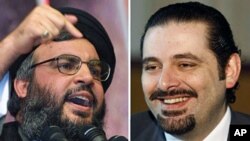Many Lebanese are worried Thursday that the fall of their national unity government could result in a new crisis in the historically volatile country.
Regional and international concern over a deepening crisis in Lebanon, following the collapse of its national unity government Wednesday, appears to have been met by a cautious, wait-and-see attitude by many Lebanese.
Lebanese TV stations concentrated on the governmental crisis, adding a tone of urgency to their usual newscasts. Eyewitnesses, however, said that most Lebanese continued to go about their business as usual.
An Nahar newspaper headlined that outgoing Prime Minister Saad Hariri is meeting with French President Nicholas Sarkozy in Paris Thursday, as his March 14 coalition holds firm in backing an international tribunal investigating the 2005 assassination of his father, former Prime Minister Rafik al Hariri.
The pro-Iranian Hezbollah, which provoked the collapse of Mr. Hariri’s cabinet, called for a new government in line with its own anti-Western alliances. Hezbollah Member of Parliament Mohammed Raad said that a new government should oppose the U.S. and other Western allies.
|
Brief Timeline |
|
He says that developments are following a political course and that Hezbollah is eager to have a new government headed by someone who will follow [its own] path of so-called resistance and who has the ability to block alleged plots by unspecified ‘arrogant’ nations.
Former acting interior minister and Hariri ally Ahmad Fatfat said Saad Hariri has enough votes to be renamed prime minister. Dory Chamoun, whose National Liberal Party is part of Mr. Hariri’s coalition, tells VOA that the streets are calm and he doesn’t anticipate a worsening crisis.
"Nothing is going on in the streets and I don't think anything will go on in the streets," he said. "I think the government will just continue as a caretaker government and we'll wait for the results of the [international] tribunal which I believe, as they promised us, I don't know how true this is, but everybody is expecting them around the middle of February, [or] at the latest, middle of March."
The Beirut press expects the tribunal to indict several members of Hezbollah over the slaying of former prime minister Rafik al Hariri.
Maronite Patriarch Mar Nasrallah Butros Sfeir urged politicians to reassure the Lebanese people that their country will not become a battleground.
He urges everyone not to make the situation worse, but says there are many problems that need to be ironed out, so that the Lebanese feel that their country is safe and secure.
Paul Haidostian, who is the President of Lebanon’s Haigazian University says though the situation remains calm, ordinary people feel helpless about recent political developments.
"This is another normal or regular day in Beirut," he said. "It's business as usual in many senses. However, the worst issue at this point is that the regular individual feels that almost everything political is beyond the control of the public. People are not sure who calls the shots, who decides what, and that people here are not in control of the local, the regional, or the international politics that goes on."
Haidostian adds that the current crisis turns public attention away from more concrete issues affecting daily life, including the economy, education, and serious ecological problems.




